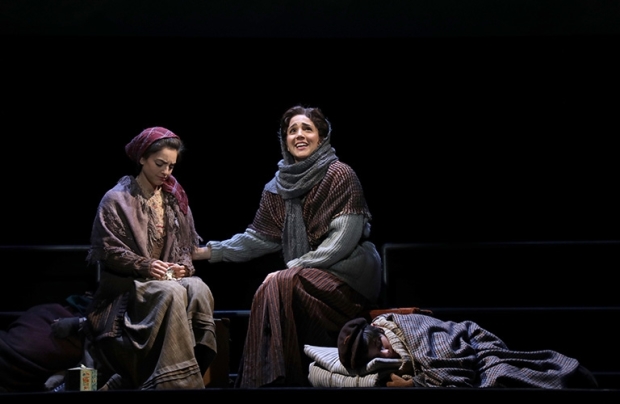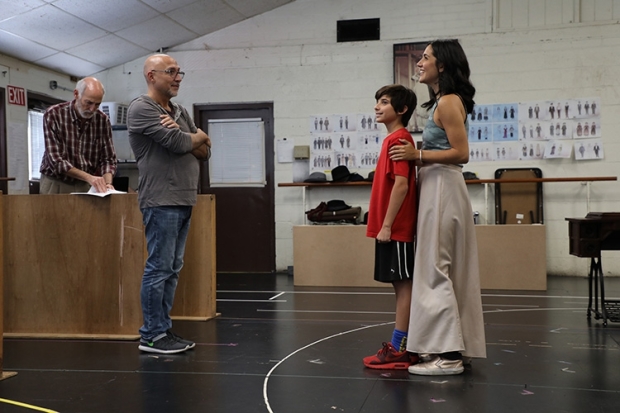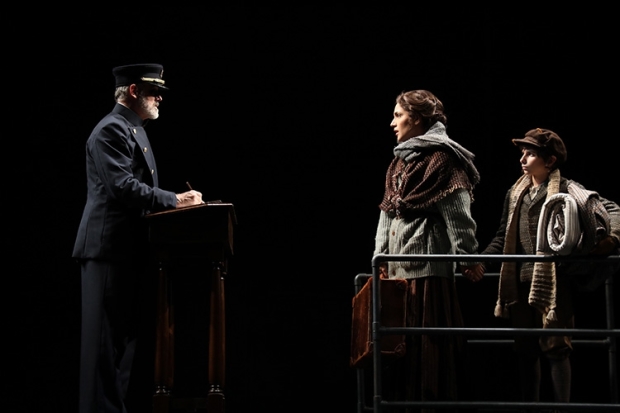As America Presses Replay on History, Rags Finds a Perfect Time to Start Over
Stephen Schwartz, Charles Strouse, and their new collaborators on a 30-year-old Broadway flop are starting from square one at the Goodspeed Opera House.

(© Diane Sobolewski)
In 1986, Rags opened and closed on Broadway after only four performances. In the years that followed, it received a handful of productions, but in the words of the show's lyricist Stephen Schwartz, they did nothing but "rearrange the deck chairs" of a musical that never quite worked. And yet, the America that the musical's late librettist Joseph Stein depicted in 1910 immigrant-flooded New York City is the same unforgiving and xenophobic country where people chanted "Take our country back" just this year in Charlottesville. Diving into a story about one of America's many cycles of immigration, the show's authors predicted at inception that if you don't learn from history, it has the unfortunate tendency to repeat itself. So when Goodspeed Musicals in East Haddam, Connecticut, proposed yet another reshuffled revival of Rags, the creative team decided it was finally time to throw out the deck chairs and start again.
"I'm not sure the theater community really knows what's been going on up here at the Goodspeed," said Samantha Massell, who has led the cast as Russian refugee Rebecca Hershkowitz since the revamped musical's first workshop this past May (a few months removed from her yearlong run as Hodel in the 2015 Broadway revival of Fiddler on the Roof). After coming offstage from a matinee with a long list of song edits, scene additions, and new orchestrations, she affirmed, "By all means, we are doing a brand-new show."
Pieces of Stephen Schwartz and Charles Strouse's score (which, despite the show's commercial failure, earned a Tony nomination) are still intact. But Strouse, at the age of 89, is composing new material as well as repurposing cut songs, while Schwartz is rewriting what he estimates is 80 percent of the original lyrics. The vision for the show, meanwhile, is largely in the hands of their new collaborators, director Rob Ruggiero, and book writer David Thompson (affectionately called "Tom" by his cast and colleagues), who, filling Stein's narrative shoes, did most of the leg work in breaking Rags apart and piecing it back together with a fresh story, revised characters, and higher stakes for its protagonist.

(© Diane Sobolewski)
"Nothing was off limits," said Ruggiero, who had minimal prior knowledge of the original material and entered the mix with unemotional objectivity. "It wasn't precious at all to me. And Stephen supported that 200 percent."
"As did the rest of the authors," added Schwartz, referring to both Strouse and Joseph Stein's widow Elisa Stein, who has been speaking on behalf of her husband's estate throughout this unorthodox process. "It's not as if we were unaware that we had a show that didn't work," Schwartz said. "But it was very hard for us to figure out how to fix it without a fresh approach coming in from the outside."
In 1986, Rebecca was a passive heroine, coming through Ellis Island with her young son, David, in search of her husband, Nathan. She eventually settled into sweatshop life on the Lower East Side, enduring poor working conditions and a pervasive culture of anti-Semitism. But as the show's Broadway director Gene Saks said in a New York Times piece published a month after the show's closing, "Rebecca was not a character but an all-purpose symbol — and that's always deadly.''
Being surrounded by a surplus of characters and plot that Schwartz compared to a "jigsaw puzzle with some extra pieces" was part of the equation that weakened Rebecca as a protagonist, and several of those extra pieces have been scrapped: Rebecca's husband no longer appears in the story, and the majority of the action is contained within a three-room tenement where Rebecca's friend Bella and Bella's father, Avram, let her live and work, sewing at their home sweatshop — an idea inspired by Ruggiero and Thompson's visit to the Lower East Side Tenement Museum. But beyond those structural changes, the creative team came to the table determined to breathe agency into their new Rebecca.
"In the original story, she just came to keep her son safe and look for her husband," said Ruggiero. "If we were really going to make this Rebecca's story, she needed to have aspiration and a journey that wasn't reactive to everything around her."
That intention manifests right at the top of the story, when Rebecca and David, without a male relative to take responsibility for them at Ellis Island, are threatened with immediate deportation. "In the original version, it was Bella and Avram that made the decision to save her," said Ruggiero. "In this version, she sees them. She's the resourceful one."

(© Diane Sobolewski)
It's a small moment, but one that sets the precedent for a character who is in charge of her own trajectory and, as such, has earned her right to the title song — a number that previously belonged to the secondary character Bella. Now, after singing her son the hopeful words, "Look, David…Now it belongs to you" in the song "Brand New World," she gets to bookend Act 1 with the disillusioned lyrics, "I'm just one more Jew in her rags."
Consequently, when Rebecca finally delivers her ballad, "Children of the Wind," she's not just singing from the position of someone tossed around by political currents. "She realizes the power of her own journey and claims it," said Massell. "Tom often says that this show begs the question, 'What do we hold on to when we assimilate and what do we give up?' We see Rebecca discover the beauty of that choice and the beauty that she gets to make that choice at all."
That kind of self-possession is valuable to see portrayed in any woman, though, at this moment in America, even more valuable to see portrayed in a refugee. "People were saying about Jewish immigrants what people are saying today about Muslim immigrants," said Schwartz, whose lyrics suddenly have an urgency they did not possess in 1986. "Each generation of assimilated Americans worries that a new group of people coming into the country are somehow going to destroy the country. Eventually we have to learn in fact they're not going to destroy the country. They are going to help build the country."
"We didn't do this work to make a political statement," added Ruggiero, "but we cannot do a show like Rags in 2017 and pretend that there's no relevance there."
It's all a delicate calculus, but at the end of the day, every risk is a risk worth taking when you have what Schwartz bluntly frames as a "no-lose situation."
"We have a show that doesn't work," he said. "So if we now have a new show that doesn't work — well, we're no worse off than we were before."
And whatever the verdict, Schwartz is looking forward to the day his cast can pay a visit to the Lincoln Center theater archives. "Don't do this yet, but at some point, you might just want to go and see what this was," he told his Goodspeed ensemble. "Your little heads will explode."







